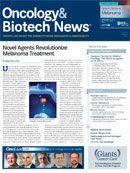Publication
Article
Oncology & Biotech News
Combination of Cixutumumab and Temsirolimus Demonstrates Improved Progression-Free and Encouraging Overall Survival for Bone and Soft Tissue Sarcoma
Author(s):
The first and largest national clinical study to evaluate the safety and efficacy of an IGF-1R antibody and an mTOR inhibitor in combination therapy for a range of sarcomas has achieved its primary endpoint of improvement in progression-free survival at 12 weeks in patients with bone and soft-tissue sarcomas.
Gary Schwartz, MD
Chief, Melanoma and Sarcoma Service Memorial Sloan-Kettering Cancer Center
The first and largest national clinical study to evaluate the safety and efficacy of an IGF-1R antibody (cixutumumab) and an mTOR inhibitor (temsirolimus) in combination therapy for a range of sarcomas has achieved its primary endpoint of improvement in progression-free survival at 12 weeks in patients with bone and soft-tissue sarcomas. The drug combination demonstrated clinical activity that merits the need for future trials.
The evidence of stable disease for more than 1 year in patients with solitary fibrous tumor and of partial response in patients diagnosed with Ewing sarcoma, osteosarcoma, or chondrosarcoma indicates that these drugs offer significant clinical benefit to subsets of patients. Toxicities were consistent with what has been reported previously for this drug combination.
Approximately 13,000 cases of soft-tissue and bone sarcoma are diagnosed annually in the United States. The median survival time from diagnosis for patients with metastatic disease is about 10 to 18 months.
Researchers at Memorial Sloan-Kettering Cancer Center undertook the multicenter, open-label, phase II study in 19 cancer centers nationwide. The findings were published in The Lancet Oncology in April 2013.
Progression-Free Survival at 12 Weeks
Nationwide, 388 patients aged ≥16 years who progressed after one (and up to four) prior chemo regimens, with a confirmed diagnosis of bone or soft-tissue sarcoma were allocated on the basis of IGF-1R expression by immunohistochemistry to one of three treatment groups: IGF-1R-positive soft-tissue sarcoma, IGF-1R-positive bone sarcomas, or IGF-1R-negative bone and soft-tissue sarcoma.
Of the 54 assigned to each group, the following were progression-free at 12 weeks by intentionto- treat analysis:
- 17 in the IGF-1R-positive soft-tissue sarcoma group
- 19 in the IGF-1R-positive bone sarcoma group
- 21 in the IGF-1R-negative group
Although patients are still being treated, this trial has completed enrollment.
Median Progression-Free Survival
Median progression-free survival, overall survival, and response according to histological subtype and IGF-1R status were analyzed.
The median progression-free survival for the most common histological subtypes were 7.5 weeks for Ewing sarcoma, 6.0 weeks for osteosarcoma, 21.4 weeks for chondrosarcoma, 11.4 weeks for leiomyosarcoma, and 12.9 weeks for undifferentiated pleomorphic sarcoma.
For patients with osteosarcoma and leiomyosarcoma, IGF-1R status did not affect median progression- free survival. However, for Ewing sarcoma and chondrosarcoma, IGF-1R immunohistochemistry expression had a statistically significant effect on median progression-free survival.
For patients with Ewing sarcoma, the median progression- free survival was 5.7 weeks for those with IGF-1R-positive disease and 17.7 weeks for those with IGF-1R-negative disease. For patients with chondrosarcoma, the median progressionfree survival was 23.0 weeks for those with IGF-1R-positive disease and 8.1 weeks for those with IGF-1R-negative disease.
The primary endpoint of progression-free survival at 12 weeks ranged from 31% in patients with IGF-1R-positive, soft-tissue sarcomas to 39% in patients with IGF-1R-negative sarcoma.
Median Overall Survival
Median overall survival was 16.2 months for Ewing sarcoma, 14.6 months for leiomyosarcoma, not reached for osteosarcoma, 13.6 months for chondrosarcoma, 15.5 months for undifferentiated pleomorphic sarcoma, and 18.9 months for others. Patients with IGF-1R-negative Ewing sarcoma also had a numerical improvement in median overall survival when compared with those who were IGF-1R-positive.





















%20(2)%201-Recovered-Recovered-Recovered-Recovered-Recovered-Recovered-Recovered-Recovered-Recovered-Recovered-Recovered-Recovered-Recovered-Recovered-Recovered-Recovered-Recovered-Recovered.jpg?fit=crop&auto=format)
%20(2)%201-Recovered-Recovered-Recovered-Recovered-Recovered-Recovered-Recovered-Recovered-Recovered-Recovered-Recovered-Recovered-Recovered-Recovered-Recovered-Recovered-Recovered-Recovered.jpg?fit=crop&auto=format)
